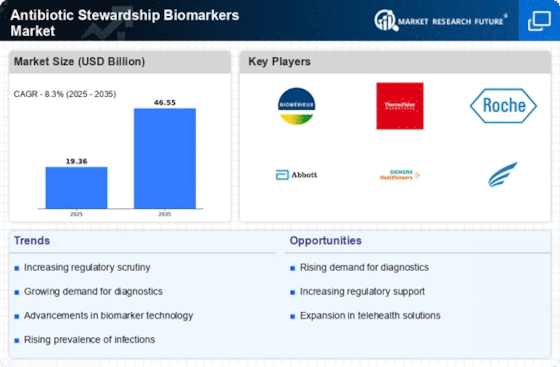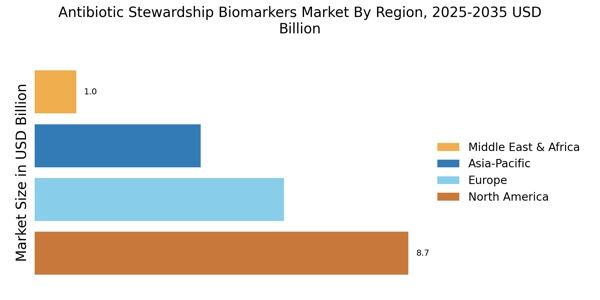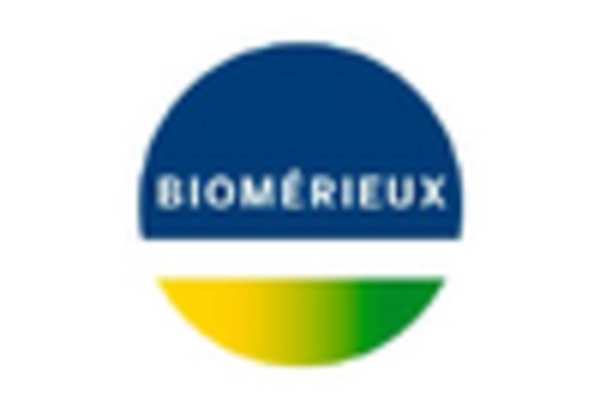Increasing Incidence of Infections
The rising incidence of infections caused by antibiotic-resistant bacteria is a critical driver for the Antibiotic Stewardship Biomarkers Market. As healthcare systems grapple with the challenges posed by these infections, the need for effective diagnostic tools becomes paramount. Reports indicate that antibiotic resistance contributes to approximately 700,000 deaths annually, a figure that could escalate if not addressed. This alarming trend underscores the necessity for biomarkers that can guide appropriate antibiotic use, thereby enhancing patient outcomes and reducing healthcare costs. The Antibiotic Stewardship Biomarkers Market is thus positioned to grow as healthcare providers seek innovative solutions to combat this pressing issue.
Growing Demand for Personalized Medicine
The shift towards personalized medicine is a significant driver for the Antibiotic Stewardship Biomarkers Market. As healthcare moves away from a one-size-fits-all approach, there is a growing recognition of the need for individualized treatment strategies. Biomarkers play a crucial role in this paradigm shift by enabling clinicians to select the most appropriate antibiotics based on a patient's specific infection profile. This trend is expected to enhance treatment efficacy and reduce the risk of adverse effects associated with broad-spectrum antibiotics. Consequently, the market for antibiotic stewardship biomarkers is likely to flourish as personalized medicine becomes increasingly mainstream.
Rising Healthcare Costs and Economic Burden
The escalating costs associated with antibiotic resistance and ineffective treatments are driving the Antibiotic Stewardship Biomarkers Market. Healthcare systems face substantial economic burdens due to prolonged hospital stays, increased morbidity, and the need for more expensive alternative therapies. Estimates suggest that antibiotic-resistant infections could cost the economy over 20 billion dollars annually in direct healthcare expenses. This financial strain compels healthcare providers to seek effective solutions, such as biomarkers that can optimize antibiotic use and reduce unnecessary expenditures. As a result, the market for antibiotic stewardship biomarkers is poised for growth as stakeholders aim to mitigate these economic challenges.
Regulatory Support for Stewardship Initiatives
Regulatory bodies are increasingly advocating for antibiotic stewardship programs, which significantly influences the Antibiotic Stewardship Biomarkers Market. Initiatives such as the Centers for Disease Control and Prevention's (CDC) Core Elements of Antibiotic Stewardship provide frameworks that encourage healthcare facilities to implement effective stewardship practices. This regulatory support not only promotes the adoption of biomarkers but also fosters collaboration among stakeholders, including healthcare providers and diagnostic companies. As a result, the market is likely to witness a surge in demand for biomarkers that can facilitate the monitoring and optimization of antibiotic therapy, ultimately improving patient care.
Technological Innovations in Biomarker Development
Technological advancements in biomarker development are propelling the Antibiotic Stewardship Biomarkers Market forward. Innovations such as next-generation sequencing and advanced proteomics are enabling the identification of novel biomarkers that can accurately predict bacterial infections and their susceptibility to antibiotics. These technologies enhance the precision of diagnostics, allowing for tailored treatment plans that minimize unnecessary antibiotic use. The market is projected to expand as healthcare providers increasingly adopt these cutting-edge technologies to improve patient outcomes and combat antibiotic resistance effectively. The integration of such innovations is likely to redefine the landscape of antibiotic stewardship.

















